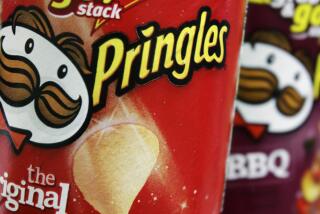Welcome jolt for Pinkberry
- Share via
Watch out world, a frozen treat could be the next latte.
A venture capital firm co-founded by Starbucks Corp. Chairman Howard Schultz has purchased a large serving of the crazy successful, sweet-yet-tart-dessert chain Pinkberry Inc. for $27.5 million, the firm, Maveron, said late Monday.
Schultz and Dan Levitan, the other founder of Seattle-based Maveron, want L.A.-based Pinkberry to expand beyond Southern California, where it has 28 stores, and New York, where it has five.
“Pinkberry has an opportunity to build a national and a global footprint,” Schultz said in an interview. “It’s very rare to see a retail company, so early on, create the kind of customer loyalty and emotional attachment that they’ve been able to create. In 30 years, I can count on one hand the number of time I’ve witnessed it.”
Since Pinkberry was founded in a 600-square-foot space, a former garage, in West Hollywood in early 2005, the tangy, low-calorie treat has become a phenomenon, creating four-times-a-week addicts and spawning celebrity devotion, along with a chorus of imitators with knock-off names like Kiwiberri, Roseberry and Berri Good.
Pinkberry’s founders knew they had a hit in the early days. They were summoned to the first store because the ceiling had sprung a major water leak and discovered it was mobbed with customers anyway.
Hyekyung “Shelly” Hwang focused on the dessert, while a friend, kickboxer-turned-architect Young Lee, designed the pastel-hued interior of the stores. Lee said the stores’ loud music helped evoke the feeling of an old-fashioned ice-cream truck.
All but three of the 33 Pinkberry stores are owned by franchisees, and the operational headaches have mounted accordingly.
“I have my limits as a multitasking person,” Lee said. “The leasing situations, dealing with franchising -- it met my limit.”
Schultz knows something about expanding quickly without alienating a customer base, having joined Starbucks when it had four locations. Today the coffee chain has 15,000 stores worldwide.
“They have been there, where we want to go,” said Lee, adding that Pinkberry would aim to do some things differently. “We can get big but also stay small,” he said. “It may sound like an oxymoron, but that is my main goal.”
Lee cited Apple Inc. and Nike Inc. as companies that have maintained a positive social feel in their stores and marketing.
“My partner and I feel like we had a child together, and now we need another master for our child’s growth,” Lee said.
South Korean immigrants Lee, 43, and Hwang, 33, will remain actively involved, while Schultz will help set strategy and seek out top executives. Neither the founders nor Maveron will have a majority stake, because another chunk of equity will be devoted to stock options for employees.
Maveron had been courting Pinkberry since November, as have many other venture capital firms and wealthy individual investors. Lee said he wouldn’t reveal the famous names who wanted to invest, “for their own good.”
Nine-year-old Maveron, which is currently investing its third, $600-million fund, is unusual in that it looks for hot consumer brands instead of emerging technologies. Its hits include EBay Inc., Drugstore.com and Web photo site Shutterfly Inc.
--
--
(BEGIN TEXT OF INFOBOX)
Mixed flavors
Other investments by Maveron, co-founded in 1998 by Starbucks chief Howard Schultz, and the year it invested
Cranium, 2003: Board game developer from Seattle, founded by Microsoft executives
Drugstore.com, 1999: Online pharmacy, also based in Washington state
EBay, 1998: Largest Internet-based auction and shopping site
Motley Fool, 1999: Investment advisor, publisher of columns and newsletters
Potbelly Sandwich Works, 2001: Pioneer chain of hot sandwich shops with seven stores at that time, now 170
Shutterfly, 2006: Online provider of digital photo products and services
--
Sources: Hoover’s, Times research
--
Los Angeles Times
More to Read
Inside the business of entertainment
The Wide Shot brings you news, analysis and insights on everything from streaming wars to production — and what it all means for the future.
You may occasionally receive promotional content from the Los Angeles Times.










